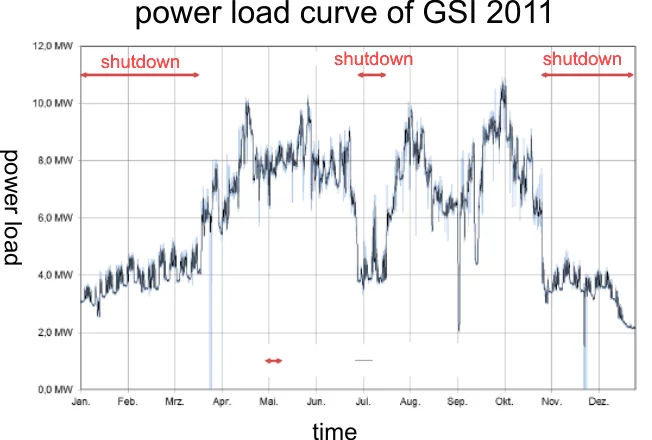EnEfficient - an activity within the European effort
Task: 3.5
This task is led by GSI.Contact: Jens STADLMANN at GSI Research centers consume vast amounts of energy, especially if their research includes operating of machinery such as accelerators or high performance computers. Increasing energy costs stress budgets and may limit the science output. Beside lowering the overall power consumption by various means addressed in other workpackages we try to find solutions to contribute to the power network stability.
One approach is to identify energy consumers which are eligible to be shut down
by the energy grid operators on short notice without harming or at least with
minimal impact on the science output of the facility. Even if the impact to the
network of a single energy consuming device is low, bundling many switchable
consumers into one virtual power plant, can give the grid operators a significant
handle for maintaining network stability. Typical candidates would be cooling and
heating plants, which have to keep their recipients in a certain temperature
range and can be switched off as long as the limits are not violated.
The picture shows the 2011 load curve of the GSI Helmholtzzentrum für Schwerionenforschung in Darmstadt. The energy use is dominated by the operation of GSI's accelerator complex. Depending on the type of experiment the power load is differing by several megawatts. By identifying the individual primary energy consuming devices and modelling them into a rough model one could use this model already during the scheduling of experiments in an effort to avoid highest peak loads. Note that the peak load is about one to two megawatts above the general load during accelerator operation.
Both described approaches require a profound analysis of the energy consumption of the research center's infrastructure. Methods developed for one science center might be applicable to other facilities because even with different research goals lots of the used machinery is similar at large research facilities.
Focus of this workpackage is network activity between energy network experts and users and operators of large scale science facilities and cooperation of research centers all over Europe.
The picture shows the 2011 load curve of the GSI Helmholtzzentrum für Schwerionenforschung in Darmstadt. The energy use is dominated by the operation of GSI's accelerator complex. Depending on the type of experiment the power load is differing by several megawatts. By identifying the individual primary energy consuming devices and modelling them into a rough model one could use this model already during the scheduling of experiments in an effort to avoid highest peak loads. Note that the peak load is about one to two megawatts above the general load during accelerator operation.
Both described approaches require a profound analysis of the energy consumption of the research center's infrastructure. Methods developed for one science center might be applicable to other facilities because even with different research goals lots of the used machinery is similar at large research facilities.
Focus of this workpackage is network activity between energy network experts and users and operators of large scale science facilities and cooperation of research centers all over Europe.
EuCARD-2 is co-funded by the partners and the European Commission
under Capacities 7th Framework Programme, Grant Agreement 312453.



